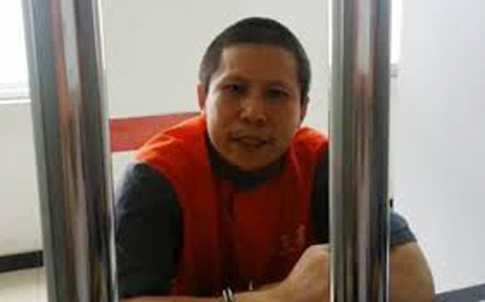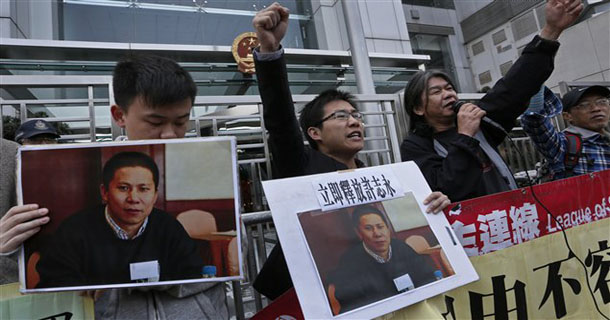Xu Zhiyong, a prominent legal activist, has been sent to prison for four years. Detained under house arrest since 2009, Xu was finally arrested formally on August 22 last year on the charge of “assembling a crowd to disrupt order in a public place.” His trial ended without a verdict on January 22.
During the trial a three-block security cordon was erected around the courthouse; foreign journalists reported being “manhandled, detained, and their equipment broken”, and another was “bundled by thugs and cops while broadcasting live.” According to reports, a number of people were taken away by the police including human rights lawyer Liang Xiaojun, Sichuan activist Chen Yunfei , and Shanghai petitioner Wu Yufen.
Beijing-based human rights defenders have also reported that, before the trial, the authorities had begun monitoring and restricting their movements, and alleged that the Beijing Public Security Bureau instructed its subunits to tighten control of individuals designated as “stability maintenance targets” in order to prevent them from showing up at the trial.
Xu’s two lawyers, Zhang Qingfang and Yang Jinzhu, told Human Rights in China (HRIC) that they and Xu remained silent during most of the court hearing to protest the “unjust nature” of the trial. However, in his closing statement Xu said “While on the face of it, this appears to be an issue of the boundary between a citizen’s right to free speech and public order, what this is, in fact, is the issue of whether or not you recognize a citizen’s constitutional rights. On a still deeper level, this is actually an issue of fears you all carry within: fear of a public trial, fear of a citizen’s freedom to observe a trial, fear of my name appearing online, and fear of the free society nearly upon us.”
Xu is a supporter of Tibetan rights as well as campaigning for democratic change, free speech, anti-corruption and rule of law in China. In 2003, he co-founded the Open Constitution Initiative (Gongmeng) that advocates the rule of law and greater constitutional protections, and published a report criticising the Chinese government’s policies on Tibet. The report declared that the failed Chinese government policies in Tibet was the cause of the mass protests in Tibet. The Chinese authorities have blamed His Holiness the Dalai Lama for instigating the protests.
Xu travelled to north-east Tibet to investigate the spiralling number of self-immolations and subsequently wrote Tibet is Burning for the New York Times, saying in the report,“I am sorry we Han Chinese have been silent as….Tibetans are dying for freedom. We are victims ourselves, living in estrangement, infighting, hatred and destruction. We share this land. It’s our shared home, our shared responsibility, our shared dream — and it will be our shared deliverance”.
The International Tibet Network, a global coalition of around 190 Tibet groups, urged the Chinese government to release Xu Zhiyong, and appealed the Chinese leadership to drop all “politically motivated” charges against him. Tibet campaigners also called on world governments to make urgent representations to China’s leaders on Xu’s behalf.
The US based rights group Human Rights Watch has called the sentences “a pretext to chill popular protests against corruption” Brad Adams, Asia Director for the rights group, said the courts “harsh” verdict for a “moderate critic” reflects how little tolerance there is towards dissent in China today. “Xi Jinping has made fighting corruption the linchpin of his presidency, but when an average citizen takes up the same cause, He is sent to prison. This hypocrisy makes a mockery of the president’s anti-corruption campaign”.






 Print
Print Email
Email